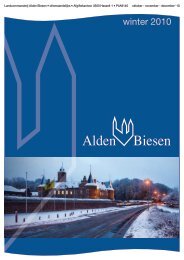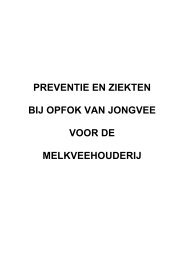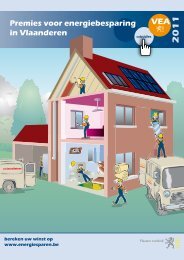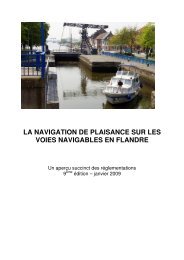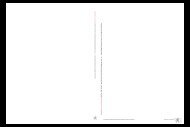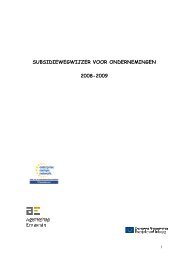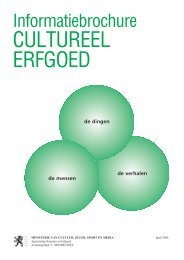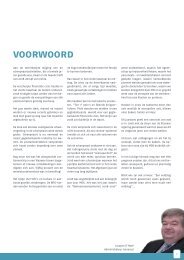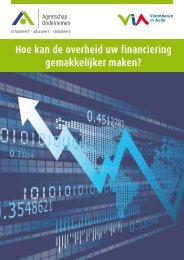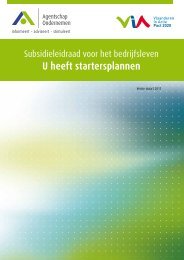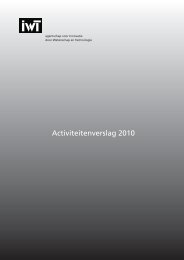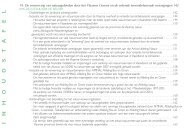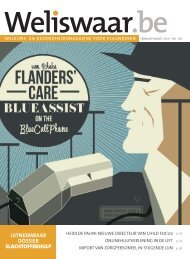Acknowledgements Book of abstracts - Publicaties - Vlaanderen.be
Acknowledgements Book of abstracts - Publicaties - Vlaanderen.be
Acknowledgements Book of abstracts - Publicaties - Vlaanderen.be
You also want an ePaper? Increase the reach of your titles
YUMPU automatically turns print PDFs into web optimized ePapers that Google loves.
89<br />
Poster 17<br />
Margot Sprenger presents Poster 17 during the poster sessions in the Aula.<br />
Session theme 1: Development, validation and automated measurements <strong>of</strong> indicators <strong>of</strong> animal welfare<br />
MEASURING THIRST IN BROILER CHICKENS<br />
M. Sprenger, F. Tuyttens<br />
Animal Sciences, Institute for Agricultural and Fisheries Research, Melle, Belgium<br />
While freedom <strong>of</strong> thirst has long <strong>be</strong>en considered as <strong>of</strong> paramount importance for animal welfare, a<br />
feasible animal-based indicator to assess thirst on-farm or at-slaughter is not available.<br />
The aim <strong>of</strong> this experiment is to develop a <strong>be</strong>havioural and physiological parameter to assess thirst<br />
in broiler chickens. A total <strong>of</strong> 128 birds were randomly assigned to one <strong>of</strong> four treatments (0, 6, 12,<br />
or 24 hours <strong>of</strong> water deprivation). After the deprivation period, water was <strong>of</strong>fered to all groups in a<br />
mobile drinker. Water consumption was measured after 30, 60, 90 and 120 minutes. To asses<br />
whether familiarity with the drinker type influenced water consumption, the drinkers were placed in<br />
the home pens <strong>of</strong> half <strong>of</strong> the groups one week <strong>be</strong>fore testing. Other <strong>be</strong>havioural and physiological<br />
parameters measured were drinking <strong>be</strong>haviour, dry matter content <strong>of</strong> faeces and intestine content<br />
and several blood parameters.<br />
Data from the first replicate <strong>of</strong> this experiment show that with longer deprivation periods, water<br />
consumption increased (18.8, 51.9, 100.2 and 148.6ml/animal/120 min for 0, 6, 12 and 24 hours <strong>of</strong><br />
deprivation respectively). Familiarity with drinker type influenced water consumption; birds that<br />
were familiar with the drinker drunk more than birds unfamiliar with the drinker. This effect<br />
appeared to decrease with increasing deprivation periods and with time during testing. For 12h and<br />
6h deprived groups, unfamiliar birds started drinking later (after 30 min) than familiar birds (within<br />
30 min).<br />
These preliminary findings illustrate the potential <strong>of</strong> very simple animal-based measures such as<br />
water consumption over time to assess thirst in chickens. For application on-farm, the influence <strong>of</strong><br />
familiarity with the test drinker ought to <strong>be</strong> taken into account and further validation tests are<br />
warranted. The potential <strong>of</strong> the other <strong>be</strong>havioural and physiological measures for on-farm or atslaughter<br />
assessment <strong>of</strong> thirst will also <strong>be</strong> discussed at the conference.<br />
Contact information: Margot Sprenger or email margot.sprenger@ilvo.vlaanderen.<strong>be</strong><br />
Complete address: Institute for Agricultural and Fisheries Research (ILVO) Animal Sciences -<br />
Animal Husbandry & Welfare, Scheldeweg 68, B-9090 Melle<br />
Species: Broiler



